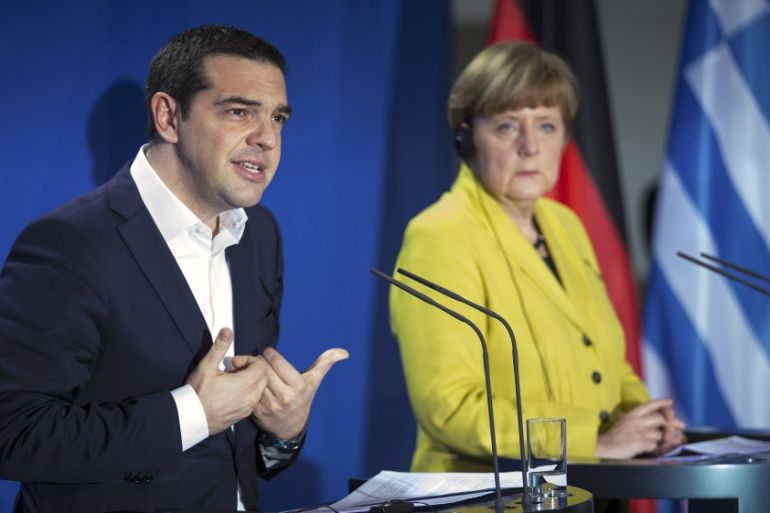Greek and German leaders hold debt talks
Greek Prime Minister Alexis Tsipras and German Chancellor Angela Merkel hold talks in Berlin but differences remain.

German Chancellor Angela Merkel and Greece’s Prime Minister Alexis Tsipras have stressed their common ground on the debt crisis after holding talks in Berlin.
At a joint press conference on Monday, the two leaders called for an end to “stereotypes” and “name-calling” between the two countries, but differences on key economic issues remained.
Keep reading
list of 4 items‘We need you’: Solomon Islands’ support for US agency’s return revealed
Why are nations racing to buy weapons?
Parallel economy: How Russia is defying the West’s boycott
Tspiras, 40, has been under pressure to strike a debt deal in order to keep the crucial bailout money flowing to the debt-ridden country.
We want Greece to be economically strong, we want Greece to grow and above all we want Greece to overcome its high unemployment.
The German Chancellor has backed austerity measures to address Greece’s debt problem, but the Greek leader has resisted them saying it has not worked.
Tspiras, making his first visit to the German capital since taking office in January, said the budget cuts and structural reforms demanded over the last five years in exchange for two bailout programmes had not been a “success story” but rather brought his country to its knees.
“A new political mix must be found,” he insisted while pledging more decisive action than his predecessors on fighting corruption and tax evasion.
The German Chancellor said that her country wanted the Greek economy to grow and to overcome high unemployment, but this would require structural reforms and solid public finances.
“We want Greece to be economically strong, we want Greece to grow and above all we want Greece to overcome its high unemployment,” she said.
Merkel also said Germany sees all partners in Europe as its equals despite having the largest economy and wants good relations with all of them, including Greece.
Merkel said the talks showed “an appetite for cooperation” although differences remained. She added that the leftist Greek prime minister’s new reform proposals would be evaluated by eurozone finance ministers, rather than by Berlin alone.
‘New relationship’
Tspiras praised the German leader, who has been caricatured as a bloodthirsty Nazi in Greece for her insistence on swingeing reforms, as a straight-shooter.
“Ms Merkel listens and wants to make progress in discussions,” he said.
Tsipras said he hoped for a new start to the relationship with Germany and urged an end to mutual stereotyping of lazy Greeks being victimised by “Nazi” Germans.
Greece recently agreed to give creditors a new list of reforms to get its bailout back on track after Tsipras held talks with European leaders in Brussels last week.
The EU also agreed to provide two billion euros ($2.19bn) to Greece to ease what Athens called a “humanitarian crisis”.
Greece’s creditors agreed in February to extend its 240-billion-euro ($255bn) bailout in exchange for promises of austerity reforms by Tsipras’s new hard-left government.
Athens wants the final seven-billion-euro tranche of the money to be paid out now to stay afloat, but Brussels wants more evidence of its commitment to the reforms.